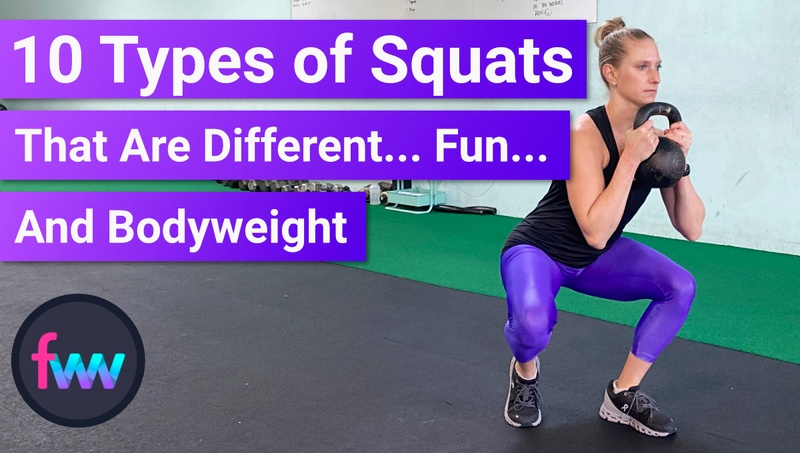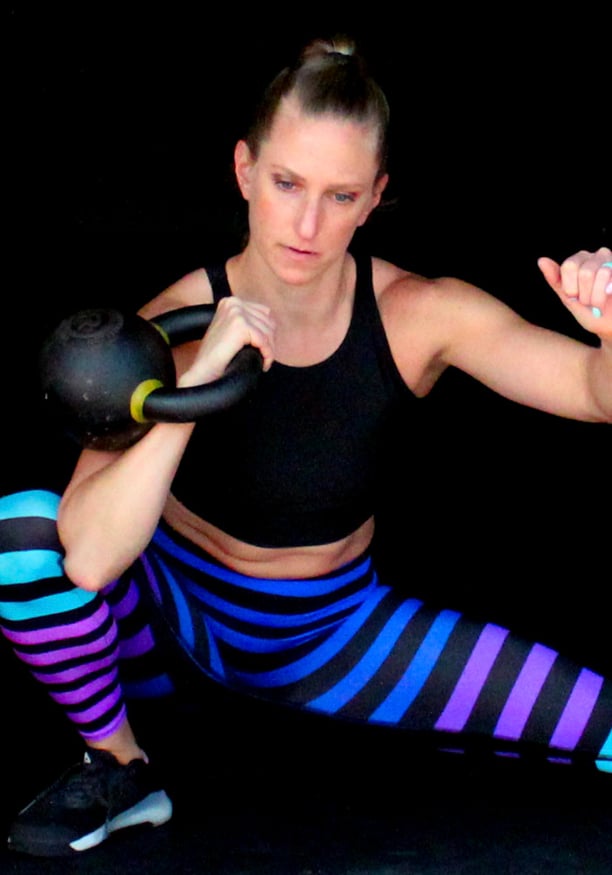Let's spice up your next leg day workout with 10 types of squats to challenge you in unique ways.
This is not going to be your typical exercise variations post. I am going to show you 10 types of squats that are all unique... fun... plus each variation can be done bodyweight only if you want.
I am going to show you the weighted versions as well. After all, I love strength training for women ... especially with kettlebells.
I've started a new series on the the blog called 5 Minute Mondays. I am going to publish at least 2, but hopefully 4 five minute workouts... one per week.
Make sure you look for one of the 5 minute squat workouts - #internal_link_not_complete - so you can push these types of squats to the test.
Let's get into this list so you know the exercises and can use them when you need to.
10 Types of Unique And Fun Squats You Can Do Anywhere
1. Staggered Squats



Staggered squats are a great way to add a little more stress to one leg without having to go to split squats or pistol squats.
What I like to do is this:
-
Take a narrower stance than normal.
-
One leg is going to step back on your tippy toes so your toes are 6 inches behind your foot.
-
Favor the leg that's "normal" and start squatting.
Play around with your squat depth and tempo. Grab some weights and give it a try.
When you use weights... especially if it's a kettlebell... hold the weight over the leg that is NOT staggered. This will help overload the leg a little more.
Remember the idea is to favor the one leg on the ground. You want to stress that leg more and improve its overall strength.
2. Squat Hops


These are one of my favorite ways to burn out my legs and get some plyometrics in without jumping.

form tip
Most adults struggle with jumping. Think about it... most adults have lost a lot of their athletic ability from when they were in their teens and early twenties.
And yet, gyms and trainers expect adults to jump and land gracefully?
Not going to happen. So try these squat hops. The key is to fall immediately into the next squat. This is where the plyometric nature of the exercise comes from.
And if you have very little coordination. Don't worry about jumping or doing any plyometrics. It's not worth it.
There are two big changes you'll make with a squat hop:
Step 1
It's dynamic. So you're going to explode out of the bottom of the squat and transition back down into the next squat in one graceful motion. You're always moving from one rep to the next with smoothness.
Step 2
When you explode from the bottom of the squat... you're not jumping. You're only going on your very tippy toes before you come straight back down.
It's like you're Michael Jackson back when he would do those really cool dance moves... so have some fun with this squat variations too.
After only 8 reps or so, your thighs are going to start burning like crazy. Fight for as many reps as you can before you need to stop and shake things out.
3. Negative Squat To Hold To Explode
If you're read my blog at all, you know I love negative training . Negative reps are one of the best ways to get stronger.
Let's combine some negatives with some exploding.
On the eccentric part of the squat... going down... you're going to go slow. As slow as you can.
Play around with the depth. Some reps stop right before parallel... other reps go just below parallel.
But once you hit the bottom... pause for one, two or three seconds and EXPLODE up as fast as you can.
Don't Jump! See above.
Just explode up quickly and then go right into the next negative. Ouch (good ouch) these are great!
4. Squat Pulse Squats




This is a classic for me. I've used these in my studio for over a decade and in Fit Women's Weekly LIVE .
A squat pulse squat is pretty simple. The idea of this exercise is to keep your muscles in tension for as long as possible... or until you're done with the set.

intensity tip
Remember, time under tension.
Time under tension is the total time your muscle tissue is fully engaged during a rep or exercise.
The longer the time under tension, the more intensity and work the muscle is doing... the better your chances for stimulating change.
Here's how to do this one:
-
Go down into a squat.
-
On the way up, stop just as you're passing parallel.
-
Go back down into a full squat.
-
Come almost all the way up and stop just before you fully straighten your legs.
-
Go back down and repeat the process.
You're never straightening your legs and that little pulse in the middle is a burner.
This is great bodyweight and with weights. Trust me, I have some variations that will make sitting on the toilet the next day an adventure.
5. Squat Lunge with Kick




Squat lunges are similar to squat pulse squats in that they prolong time under tension. But this version adds a little extra plyo (non-jumping) into the mix.
-
Go down into a squat.
-
On the way up as you're passing the parallel position...
-
Step one leg back to go into a lunge.
-
Come out of the lunge and...
-
Kick your leg out in front of you.
-
As you do, your other leg will nearly straighten.
-
Immediately step the kicking leg back down to a squat...
Here's the deal though to make this really hard.
DO NOT SWITCH LEGS
Do all your reps with one leg lunging and kicking the whole time. This will really burn out the leg that is not kicking and push your limits. You've got to push those limits.
Just imagine pairing this with the staggered squat? I can already feel the burn.
6. Bear Squats


Let's tone it down a little. Bear squats are intense... not quite as intense as what we've done so far though.
Here's how to do the bear squat:
-
Get on your hands and knees.
-
Make sure your knees are directly under your hips and your hands are under your shoulders.
-
Lift your knees an inch off the ground. Hold for a second or two.
-
Without moving the position of your shoulders...
-
Straighten your legs until they are locked out. Give them a squeeze.
-
Bring your knees to an inch off the ground and repeat.
Bear squats are a high rep exercise.
To get more from bear squats, I like to play with tempo as well. I will do some fast reps and then do some slow reps. The slow ones with a good leg squeeze are so hard.

form tip
When you're pushing off your toes, make sure your knees are not going inward. This is easy to do.
When going on tippy toes, most people tend to favor their big toe. Try not to and push your weight towards your pinky toe.
You'll feel more grounded and this will put your knees in a better mechanical power position.
7. Low Heavy Squats With Squeeze

This is a personal favorite of mine when I want to get stronger. You can do this bodyweight... but it's designed for heavy weights.
You are going to be working on end range of motion.
End range of motion is the bottom of an exercise rep where typically we are weakest because our muscles are fully engaged.
This will help your squat end range of motion strength. When you get stronger in the end range of motion, you get stronger on all levels.
-
Grab a heavy weight goblet style or rack if you're daring.
-
Get to the bottom position... maybe above parallel or just below... (pick a spot but stay there for the workout).
-
Pause for 3 seconds... and here's the kicker... you have to actively SQUEEZE your muscles. SQUEEZE and engage.
-
Then come up and repeat. Rest in-between reps if you need to.
This SQUEEZE is teaching you proper muscle activation at the end range of motion. This is typically the spot where most people use momentum and bounce.
Use a box or chair so after you're done squeezing, you can put the weight down and come back up with only bodyweight. The point of this exercise is not the full range of the rep... only the end range of motion.

intensity tip
Before you put the weight down, come up from the squat just a few inches. This is going to help train legs to make that transition from bottom to top which is wear most squats go wrong.
Once you come up a couple inches put the weight down. Try to have something soft for you to place the weight on.
8. Bulgarian Split Squats






I have a detailed breakdown of Bulgarian split squats you should check out. I breaks things down step by step.
Bulgarian (split) squats are a great exercise and a unique version of squats. There are two big differences...
-
You are focusing on one leg only. This is great.
-
You are putting your other leg in hip extension.
Hip extension is essentially your knee goes behind you hips. This is important because it's a position most people never see enough of.
In my Bulgarian split squat post, I break down some cool variations you need to try.
9. Scorpion Squats


I love scorpion squats. Like Bulgarian split squats, these are a single leg exercise. They're easier than pistol squats which we'll cover next...
Here's how to do them. Make sure you have a yoga block or a small stack of books.
-
Stand on one leg.
-
Grab your other foot behind you.
-
It helps to have a yoga block. Checkout the pictures.
-
Lean forward so you can balance your center of gravity.
-
Squat down and try to touch your knee to the yoga block or the ground. The ground is where you want to get eventually.
This is a pretty serious single leg exercise. It's great for single leg strength and it's great for balance.
I love balance exercises.
10. Pistol Squats


Our final squat variation. You have definitely heard and seen these on Instagram or TikTok before.
Pistols are like the Holy Grail of squats. And when you think about it... they are pretty incredible.
Your entire bodyweight is being squatted by one leg.
I'm not going to go into how to do these. I just wanted to mention them. I have a pistol squat progression you should checkout but keep this in mind...
Pistol squats are one of those exercises that take months... close to a year to really achieve. I'm talking consistent work at them too.
You should have them as a goal. At least the scorpion squats.
Those Where 10 Fun... Interesting... Unique Types of Squats
Are you going to use them?
I hope you do.
If you have any questions about these exercises of your want a deeper demonstration, contact me or go follow my social accounts.



